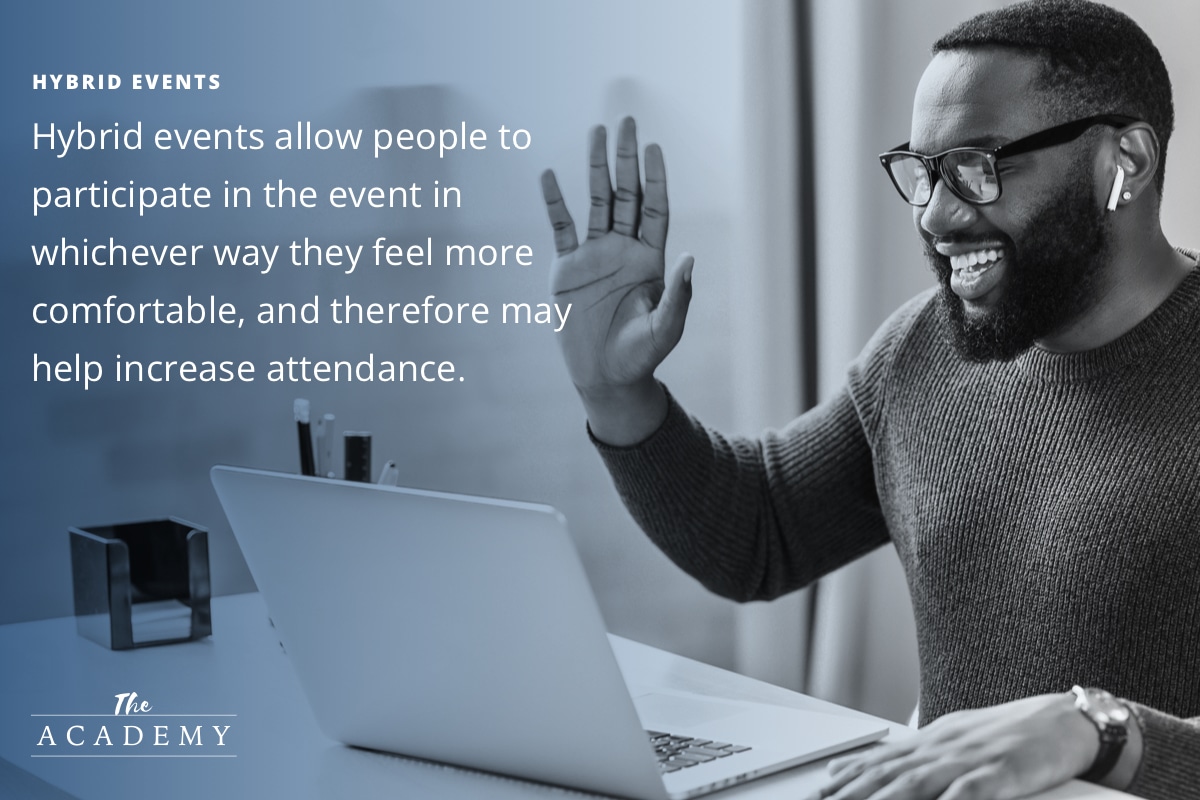
The pandemic demanded a sudden and dramatic shift in how events were held. Where in-person conferences and trade shows were the standard across nearly every market, virtual events quickly became the only option. So in 2020 and into 2021, countless events shifted format to a virtual model and made the best of a bad situation.
Post pandemic, travel has opened up once again and many businesses are back to regular nine-to-five days in the office, virtual events persist. Even in the absence of viral concerns, many businesses and organizations are opting to stick with the virtual model for a variety of reasons. In this article, we are going to take a closer look at what those reasons are, and why you might want to opt for a virtual event rather than an in-person affair.
Simply Put: Virtual Events are Convenient
There is just no getting around the fact that virtual events are far more convenient than in-person events. Yes, there are some potential drawbacks to think about, and we will get to those later in the article, but the convenience of a virtual event just can’t be beat. Whether you are coming at it from the perspective of the company throwing the event, or as an attendee, virtual makes for a far easier experience no matter how you spin it.
First, let’s look at it from the perspective of an organization that wants to put on an event. A partial list of what you’ll need to sort out when holding this event in person includes the following:
- Reserving a physical space to hold the event, assuming you don’t have room on your regular premises to welcome the expected number of guests
- Outfitting that space with the right equipment for your planned agenda, including chairs, tables, technology, signage, etc.
- Connecting with local hotels to reserve blocks of rooms and negotiate a special price for those attending your event
- Planning time to set up for the event in the days leading up, including coordinating with the facility manager and any vendors or contractors that will be involved
- Send out invitations well in advance to allow people to plan their schedules and any travel that might be necessary to attend
- Handling the “tear down” of everything after the event has finished, working either late into the night or coming back the next day
Alternatively, if that same organization was planning a similar event that was going to be held virtually, the planning process would shrink dramatically.
- Set the agenda for the event, including securing any guest speakers
- Organize the technology needed if it’s not already set up (that’s the beauty of it being virtual… You set it up where it’s convenient for you!)
- Send out invitations, likely closer to the event since no one will need to travel
That’s it. There just isn’t that much to do, and you can still put on a quality event that will deliver great value to those who choose to virtually attend. Of course, the exact process you need to go through will depend on the details of what you have planned, but in every case, things are going to be simpler when you use the virtual model.
Of course, on the other side of this coin – as someone who is going to attend an event – things are much easier virtually, as well. If you live on one side of the country and a company on the other coast is going to have an event, you can save a lot of time and money if you are able to attend on your computer rather than in person. Often, this will be the difference between being able to learn from others in your field and having to miss out. Where you might be able to afford to go to a single event or conference physically in a year, there is also no limit to how many you can attend when they are virtual.
Hosting or Attending In-Person Events Can Be Costly
We can’t write an article about virtual vs. in-person events without considering the role cost plays in this equation. No explanation is required on the point that a virtual event is going to cost just a fraction of what you would need to spend to hold an in-person outing of some kind. What would you be able to do with the money you save? It might be possible to pay for a better speaker, or more speakers, because you didn’t have to invest so much in the infrastructure required to gather everyone in the same physical location.
It’s important for each event to do some math on the cost element to see how it actually plays out, rather than just making assumptions. For instance, if you have access to a relatively affordable facility, and your attendees tend to be willing to pay a sizable price for the opportunity to attend, you might not really be saving much through the switch to virtual. Each situation is different, of course, which is why taking a close look at the financials is so important before making a choice.
Consider Environmental Concerns of In-Person Events
One issue that might not come to mind immediately when hosting in-person events is the impact that those events have on the environment as a whole. When you ask people to gather in a specific location, all of those people are going to need to use some form of transportation to reach your location, and all of that transportation burns fuel along the way. Whether it is a car or a plane, or a combination of the two, your event is going to have some kind of carbon footprint to consider.
This might not seem like a huge deal for a relatively small conference, but these things add up quickly. If conferences across a range of sectors switch to a virtual model, suddenly there will be quite a bit less travel, and less fuel burned as a result. If you like to take pride in being kind to the environment, and you want to make sure your organization is doing its part on this front, consider staying virtual with this as one of your many motivations.
Some Potential Drawbacks to Virtual Events
We aren’t going to pretend like everything is sunshine and roses when it comes to virtual events. There are some drawbacks, and we should point those out quickly here so you get a balanced perspective on this topic.
- Harder to network. One of the draws of conferences and other types of events is the chance to meet people and form connections. Countless business partnerships – and friendships in general – have been started by introductions that occurred at events. While there are some ways to create this kind of environment in the virtual landscape, it will never quite be the same as what you get when you can shake hands and sit down together for a drink or a meal.
- The fun can go missing. It’s relatively easy to include some events or activities at an in-person event that are simply there to make things fun. Sure, there is serious business to attend to, but everyone deserves some time to slow down, relax, and laugh. Again, this is something that can be harder to achieve when your event is held via videoconference. You might be able to think of some fun ideas in this format, but it will be an uphill battle.
- Trusting the tech. Yes, the technology behind virtual conferences is better than it has ever been. And yes, more people than ever before have access to a stable, fast internet connection at home or in the office. But that doesn’t mean there is no risk involved with running an online event and having something go wrong. If your technology fails at the wrong time, the whole event will be lost.
- Drifting attention. In a ballroom with a speaker standing up on the stage, pretty much everyone in the room is going to be listening closely. But what happens when they are sitting at home in their office? That attention might start to wander. Whether it’s the kids knocking at the office door or the dog wanting to go for a walk, there are always distractions close at hand to take away from the impact that your event will have on those who attend.
These potential drawbacks shouldn’t stop you from holding a virtual event, or at least from considering it as a possibility. However, they should make you think about how your event will be planned and what you can do to mitigate these issues.
Hybrid Events: The New Normal?
An option that is growing in popularity is the hybrid event, where there is both an in-person and virtual component. This allows people to participate in the event in whichever way they feel more comfortable, and therefore may help increase attendance. There’s a virtual component for those who can’t make the in-person event or who don’t want to travel to it, and there’s the traditional in-person lectures and networking components for those who want a more interactive experience.

With a hybrid event, you will likely be able to rent a smaller space than you would need otherwise, although you will have to make sure all of the tech is set up to serve your virtual crowd effectively. This doesn’t come with the low costs of an all-virtual event, but you might be able to get some industry sponsors to help offset the expenses that you do incur.
For events with a long history of in-person gathering, going to a hybrid model might be the best way to keep that tradition alive while embracing the future at the same time.
A Better Event When Made Virtual?
In the end, it’s possible that your event will be better for all involved if it is held virtually. The key is to think through what you are trying to accomplish with the event and then work backward to decide if virtual is the right way to go.
Do you want to reach as many people as possible with your message or information? Virtual makes it easier to reach a bigger crowd. Do you want to keep costs low while still having maximum impact? Again, virtual is hard to beat.
To be sure, there are still some types of events that will be better when done in person – but that no longer needs to be the default option. Take a close look at all of the factors involved when deciding how your next event will be executed. Good luck!
Most Popular Articles

Seeing Favicons in Your Google Search Results? Here’s Why…
Have you noticed anything different in your Google Search results lately? Google added tiny favicon icons to its organic search results in January. It was…

Business Growth and Digital Marketing News & Tips 4-14-24
Did you know? It’s five to twenty-five times more expensive to acquire a new customer than to retain an existing one. Increasing customer retention by…

Business Growth and Digital Marketing News & Tips 3-28-24
With the desire for precise measurement tools to determine ROI, there has been a rise in attention metrics. These metrics, which often utilize eye-tracking data,…








